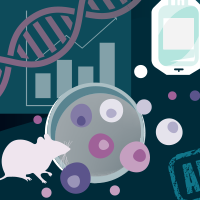Manufacturing of human iPSC-derived cell therapies: road to the clinic
Cell & Gene Therapy Insights 2020; 6(1), 177-191.
10.18609/cgti.2020.023
One of the major roadblocks in regenerative cell therapies is the lack of appropriate models of human diseases and the availability of relevant patient-specific cells capable of replacing damaged tissues and organs. Induced pluripotent stem cells (iPSCs) derived from patients provide a source of human tissue that addresses this problem and has the potential to create an entire new set of human disease models and ultimately cells for transplantation. However, coordinating the production of quality iPSCs at scale remains a challenge for most academic and industrial laboratories. In this article, we outline key clinical applications of human iPSCs, and challenges associated with at scale clinical manufacturing of iPSCs and their derivatives. Based on the experience of our team in producing, maintaining and distributing iPSC lines for a decade as a global provider of iPSC-derived cell solutions, the progress of the field in developing iPSCs and their derivatives for translating to the clinic has been reviewed here. The development of a scalable iPSC-based biomanufacturing platform will enable innovative and sustainable solutions for translating much-needed iPSC-derived cell therapies into the clinic.
